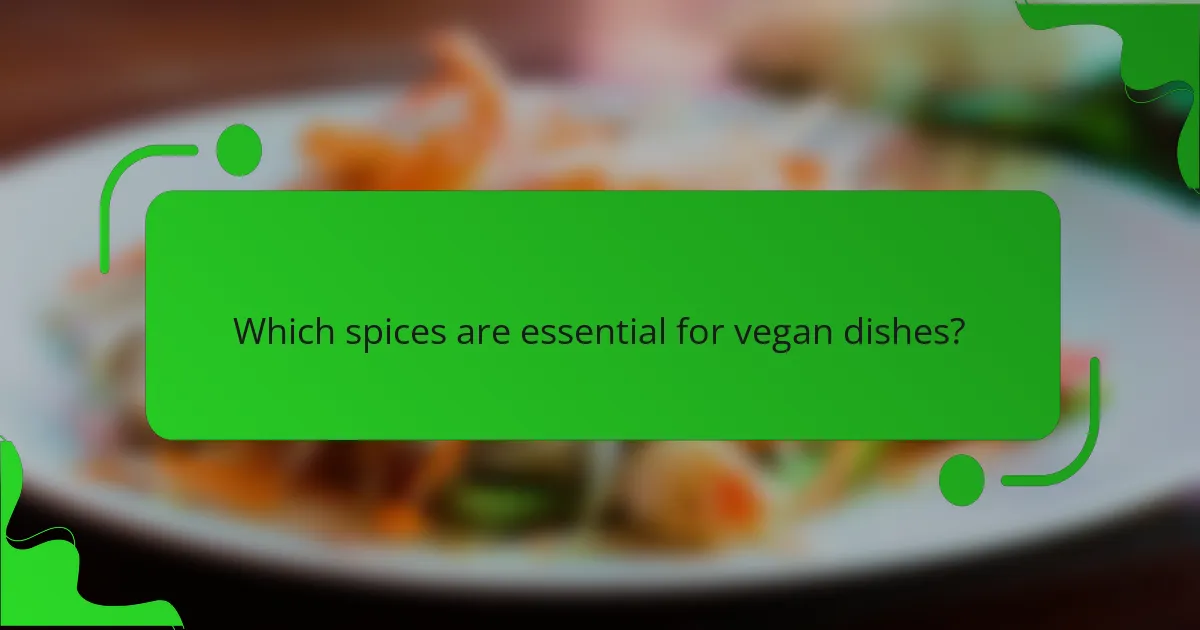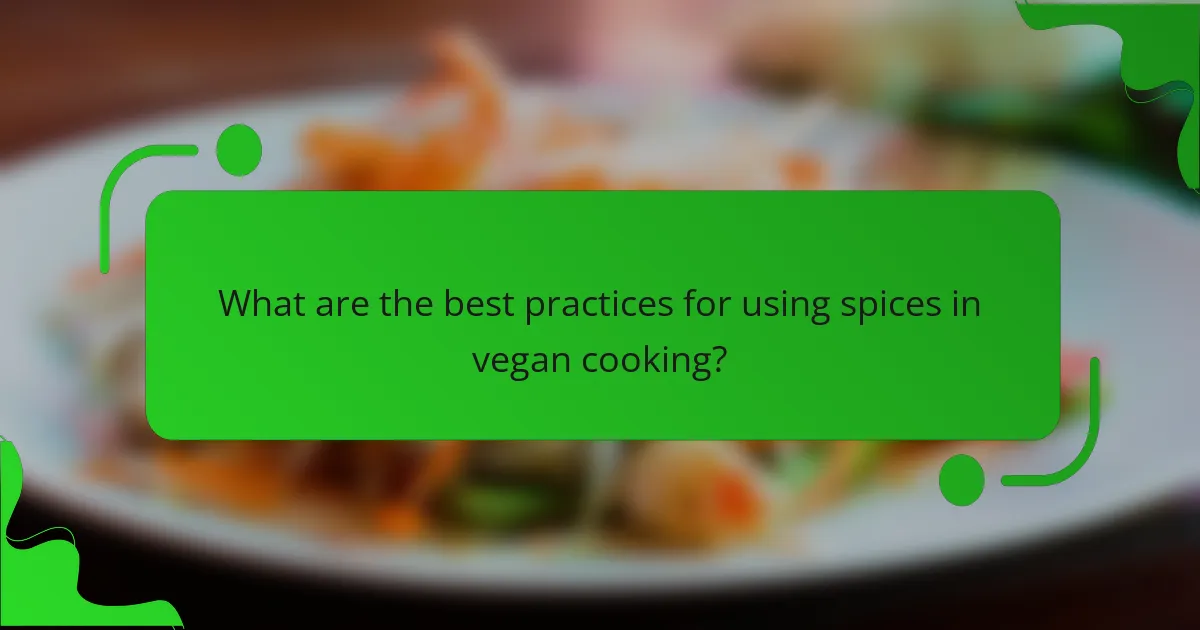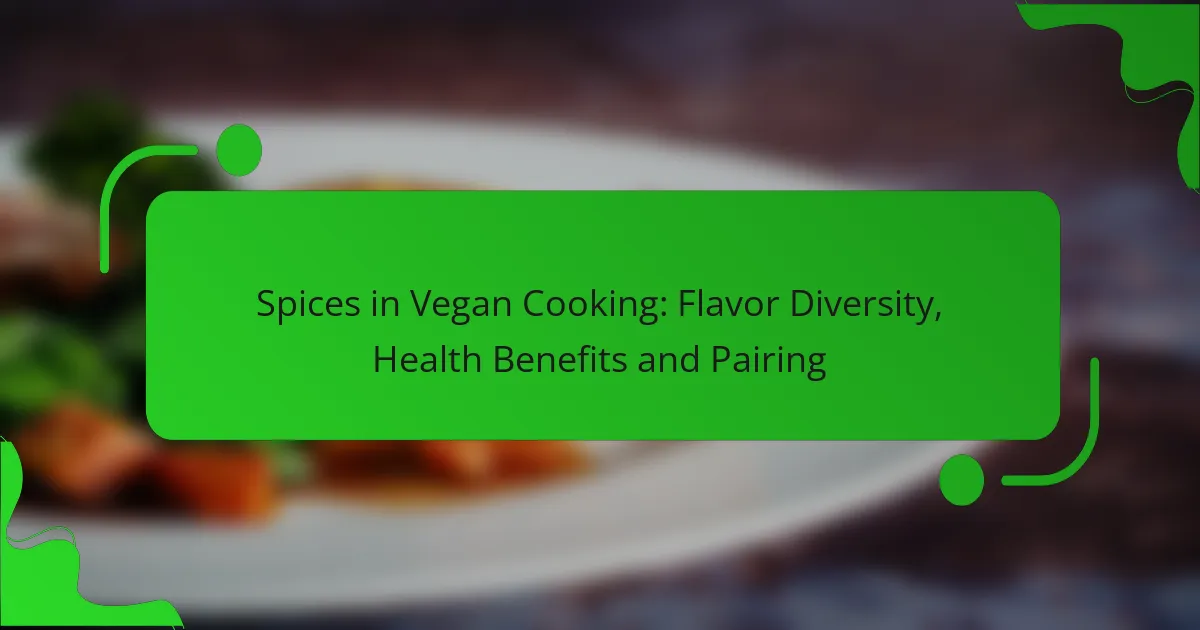Spices play a crucial role in vegan cooking, transforming simple ingredients into vibrant, flavorful dishes while also delivering numerous health benefits. By incorporating essential spices like cumin, coriander, and turmeric, home cooks can enhance the taste and nutritional value of their meals, catering to diverse palates and dietary needs. Embracing the rich diversity of spices not only elevates plant-based cuisine but also supports overall well-being.

How can spices enhance vegan cooking in Los Angeles?
Spices can significantly elevate vegan cooking in Los Angeles by adding depth and variety to dishes while also providing health benefits. With a diverse array of spices available, home cooks can create flavorful meals that cater to various tastes and dietary needs.
Boosts flavor complexity
Spices introduce layers of flavor that can transform simple vegan dishes into gourmet experiences. For instance, using smoked paprika can add a rich, smoky taste to roasted vegetables, while cumin brings warmth to bean stews. Experimenting with spice blends like garam masala or za’atar can create unique flavor profiles that excite the palate.
Incorporating spices such as turmeric or coriander not only enhances taste but also encourages creativity in the kitchen. Try mixing spices into marinades or dressings to infuse dishes with complex flavors that appeal to a wide range of preferences.
Increases nutritional value
Many spices are packed with antioxidants, vitamins, and minerals that contribute to a healthy diet. For example, turmeric contains curcumin, known for its anti-inflammatory properties, while cinnamon can help regulate blood sugar levels. Including a variety of spices in vegan meals can enhance their overall nutritional profile.
Consider adding spices like ginger for digestive health or cayenne pepper for its metabolism-boosting effects. A well-seasoned dish not only tastes better but also provides essential nutrients that support overall wellness.
Reduces reliance on salt
Using spices effectively can help reduce the need for added salt in vegan cooking, which is beneficial for heart health. Flavorful spices like garlic powder, onion powder, and herbs can enhance taste without contributing to high sodium levels. This is particularly important for those monitoring their salt intake.
To minimize salt use, focus on bold spices and herbs that can stand in for saltiness. For instance, a blend of lemon zest, black pepper, and fresh herbs can provide a bright flavor without the need for extra salt. Experiment with different combinations to find what works best for your dishes.

Which spices are essential for vegan dishes?
Essential spices for vegan dishes include cumin, coriander, and turmeric, each contributing unique flavors and health benefits. Incorporating these spices can enhance the taste of plant-based meals while offering nutritional advantages.
Cumin for warmth
Cumin is known for its warm, earthy flavor that adds depth to vegan dishes. It works well in a variety of cuisines, particularly in Indian, Middle Eastern, and Mexican recipes.
To use cumin effectively, consider toasting the seeds lightly before grinding to release their oils and enhance their flavor. A teaspoon of ground cumin can elevate soups, stews, and even roasted vegetables.
Coriander for citrus notes
Coriander provides a bright, citrus-like flavor that can lighten and balance rich vegan dishes. Both the seeds and fresh leaves (cilantro) are used, each offering distinct tastes.
Incorporate ground coriander into spice blends or use fresh cilantro as a garnish to add freshness to salads, salsas, and curries. A tablespoon of fresh cilantro can significantly enhance the overall flavor profile of a dish.
Turmeric for anti-inflammatory benefits
Turmeric is celebrated not only for its vibrant yellow color but also for its anti-inflammatory properties, making it a valuable addition to vegan cooking. Curcumin, the active compound in turmeric, is known for its health benefits.
To maximize its benefits, pair turmeric with black pepper, which enhances its absorption. Use turmeric in curries, rice dishes, or smoothies, aiming for about a teaspoon per serving to enjoy its flavor and health advantages.

What are the health benefits of spices in vegan diets?
Spices offer numerous health benefits in vegan diets, enhancing both flavor and nutrition. They can contribute to overall well-being by providing essential nutrients and promoting various bodily functions.
Antioxidant properties
Many spices are rich in antioxidants, which help combat oxidative stress and reduce inflammation in the body. Common spices like turmeric, cinnamon, and ginger contain compounds that neutralize free radicals, potentially lowering the risk of chronic diseases.
Incorporating a variety of spices into your meals can enhance your antioxidant intake. Aim to include spices in your cooking regularly, as even small amounts can contribute significantly to your overall antioxidant levels.
Supports digestion
Spices such as cumin, fennel, and coriander can aid digestion by stimulating the production of digestive enzymes. This can help alleviate common digestive issues like bloating and gas, making meals more enjoyable.
To support digestion, consider adding spices to your dishes, especially in meals that include legumes or fibrous vegetables. A pinch of these spices can make a noticeable difference in how your body processes food.
Enhances metabolism
Certain spices, like cayenne pepper and black pepper, are known to boost metabolism by increasing thermogenesis, which can aid in weight management. These spices can help your body burn calories more efficiently.
Incorporating metabolism-boosting spices into your meals can be as simple as adding a sprinkle of cayenne to soups or salads. Regular use can contribute to a more active metabolism, especially when combined with a balanced vegan diet.

How to pair spices with common vegan ingredients?
Pairing spices with common vegan ingredients enhances flavor and nutritional value. Understanding which spices complement specific ingredients can elevate your dishes and create a more satisfying meal experience.
Chili powder with beans
Chili powder adds a robust flavor to beans, making it a popular choice in vegan recipes. The heat from chili powder can enhance the natural earthiness of beans, such as black beans or pinto beans, creating a hearty dish.
When using chili powder, start with a small amount, around one teaspoon per cup of beans, and adjust to taste. This spice works well in chili, bean salads, or burritos, providing a kick that balances the creaminess of beans.
Ginger with vegetables
Ginger brings a zesty warmth that complements a variety of vegetables, particularly in stir-fries or soups. Its sharp flavor can brighten dishes featuring root vegetables like carrots and sweet potatoes or leafy greens such as spinach and kale.
For optimal flavor, use fresh ginger, grating about one tablespoon per two cups of vegetables. Be cautious not to overpower the dish; start with less and increase as needed. Ginger pairs well with soy sauce or sesame oil for an Asian-inspired flair.
Garlic with grains
Garlic enhances the flavor of grains like rice, quinoa, or barley, adding depth and aroma. Its savory notes can transform a simple grain dish into a flavorful side or main course.
To incorporate garlic, sauté one to two cloves in olive oil before adding the grains and water. This method infuses the grains with garlic’s rich flavor. Avoid burning the garlic, as it can turn bitter; cook it just until fragrant before adding other ingredients.

What are the best practices for using spices in vegan cooking?
To effectively use spices in vegan cooking, focus on balancing flavors and enhancing the natural taste of ingredients. Understanding how to select, combine, and apply spices can elevate dishes while providing health benefits.
Fresh vs. dried spices
Fresh spices, such as herbs, offer vibrant flavors and aromas, making them ideal for finishing dishes or adding brightness. Dried spices, on the other hand, provide concentrated flavors and are often more convenient for long-term storage.
When using fresh spices, consider using them towards the end of cooking to preserve their potency. Dried spices can be added earlier in the cooking process to allow their flavors to meld with other ingredients.
Proper storage techniques
To maintain the potency of spices, store them in a cool, dark place, away from heat and moisture. Glass jars with tight-fitting lids are ideal for preserving freshness, while bulk spices should be transferred from their original packaging.
Avoid storing spices above the stove or in direct sunlight, as this can lead to loss of flavor. Regularly check for freshness; dried spices typically last about 1-3 years, while fresh herbs should be used within a few weeks for optimal flavor.



